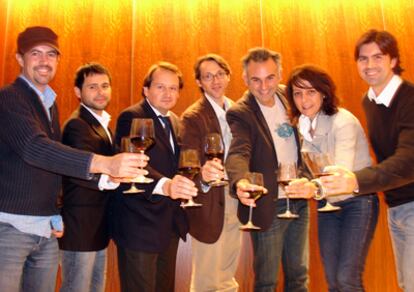Silicon Spaniards: net pioneers find successful formula far from home
Entrepreneurs have few regrets about making the leap across the pond
"There comes a moment when Spain comes to an end," says Juan Pablo Puerta to explain his decision to move to that land of sun and grapes known as California, home of geek heaven: Silicon Valley.
Puerta, a 32-year-old engineer and international director for the listings website Craigslist, is part of a growing group of Spaniards who are settling down in the San Francisco Bay area. Like him, Javier Cardona, the founder of Cozybit; Alfonso de la Nuez, creator of UserZoom; Nina Alastruey, founder of The Channer, and Roger Casals, creator of PasswordBank, are the Iberian version of the bootstrap entrepreneur. They have all migrated to Silicon Valley in pursuit of the dream that kept eluding them in Spain: success.
"If you want to be an entrepreneur, it doesn't even compare. You work a thousand times better here, you earn a lot more dough and there is a really powerful ecosystem of capital and talent," explains Alfonso de la Nuez, 37, who used to be a frustrated basketball player before making the jump into the tech world. He has been in California three years now, at the forefront of UserZoom, a company with 12 employees that markets a usability analysis program that is already being used by Google, IBM and Verizon.
"Silicon Valley is not a place, it's a mentality. In Spain they consider us to be either arrogant or crazy." Nina Alastruey agrees, although she sees it as a broader Europe-wide problem.
"A high-ranking official in a multinational corporation there does not listen to any advice from the outside, much less from an entrepreneur. How could anybody know more than he does if he's been with the company for 25 years! This sort of thing happens in Spain, France and Britain. Over here, it's the other way around. Everyone is open to hearing about the latest trend because nobody knows where it is coming from. That is what makes this place unique."
Alastruey has just launched her company, The Channer, which commercializes a software application that allows users to watch hundreds of television channels on their cellphones or tablets. The firm is currently waiting for a $2-million round of investment.
Bringing together a bunch of Spanish entrepreneurs in California is a surefire way to hear an avalanche of laments about Spain. Roger Casals jumps when he hears the word "money." "Ever since I came here I'm going bonkers; all I think about is getting $20-million investments, not the measly 500,000 euros I aspired to over there."
"There" is Barcelona, his native city. At age 14, instead of posters of Cicciolina, his walls were lined with pictures of Steve Jobs and Bill Gates. At 25 he set up his first company, and now, at 39, he is into his eighth business venture, PasswordBank, an electronic security company with 25 employees working out of the United States, Asia, Latin America and Spain. That's the thing about the internet: small and medium-sized companies can now go global.
But Casals is also candid about the difficulties involved. "Finding a niche here is very difficult. Competition is fierce and Spanish technology is unfortunately not synonymous with credibility."
Jordi Cardona, founder of Cozybit, whose software sits inside chips made by Intel, Marvell and Honeywell, is living proof of the obstacle course that penetrating the US market can become. "I've created two start-ups and I'm on my third... I hope it works, because being a serial entrepreneur is just not my thing..." he laughs. He is another one of the veterans: he arrived in the US before 2000, during the dotcom boom, and has remained here all this time.
For anyone thinking of making the jump across the Atlantic, a word of advice from Manuel Maqueda, a resident of San Francisco for the last 13 years and vice-president of Blosee, a social network for sea lovers: "You have to know how to sell your idea in 30 seconds."
Cardona also recommends bringing your own Spanish engineers over with you. "They are real expensive here, and as soon as they can, they go over to the big companies."
Despite the crisis, the pull of Silicon Valley remains intact. Around 70 percent of Bay Area residents are foreign, and the region is an inexhaustible magnet for talent. "In the last year and a half, we have helped nearly 200 Spanish firms close deals or come here directly," says José Mateos, co-founder of Spain Nexus, a company that helps Spanish entrepreneurs in California. He has been in the Valley for nearly five years and misses very few things from home. "We live like kings. It's going back that's going to be tough."

Tu suscripción se está usando en otro dispositivo
¿Quieres añadir otro usuario a tu suscripción?
Si continúas leyendo en este dispositivo, no se podrá leer en el otro.
FlechaTu suscripción se está usando en otro dispositivo y solo puedes acceder a EL PAÍS desde un dispositivo a la vez.
Si quieres compartir tu cuenta, cambia tu suscripción a la modalidad Premium, así podrás añadir otro usuario. Cada uno accederá con su propia cuenta de email, lo que os permitirá personalizar vuestra experiencia en EL PAÍS.
¿Tienes una suscripción de empresa? Accede aquí para contratar más cuentas.
En el caso de no saber quién está usando tu cuenta, te recomendamos cambiar tu contraseña aquí.
Si decides continuar compartiendo tu cuenta, este mensaje se mostrará en tu dispositivo y en el de la otra persona que está usando tu cuenta de forma indefinida, afectando a tu experiencia de lectura. Puedes consultar aquí los términos y condiciones de la suscripción digital.








































